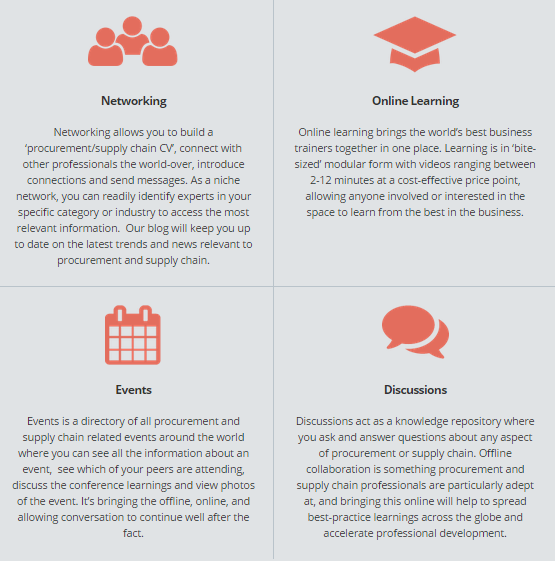
by Jennifer Hart Yim | Mar 17, 2016 | Blog, Leadership, Marketing, Social Media, Strategy, Supply Chain

Source: Library of Congress
This is a guest post written by Tania Seary, founder of Procurious. Procurious, the world’s first online social network for supply chain and procurement professionals, has acquired more than 12,000 members in less than two years.
I’m trying to use a baseball analogy here, but appreciate that my headline does have other connotations!
Another analogy might be to say that we’re “getting the flywheel spinning” here at Procurious – the world’s first online network for supply chain and procurement professionals.
Now, for those of you who aren’t familiar with the flywheel analogy, it is a metaphor created by author Jim Collins in his famous business manifesto, “From Good to Great,” to explain one of the key drivers for creating long-term success in business.
A flywheel is a heavy disk on an axle used to smooth a machine’s operation to generate momentum and maintain a constant rotational speed.
It takes much effort and persistence to get the metaphorical flywheel to move, but consistent energy in one direction over time helps build momentum and ultimately leads to a breakthrough. In the case of Procurious, as with Collins’ companies, there has been no specific event, decision, action, or lucky moment that single-handedly helped us to successfully break through the “beta” stage, to where we are today.
Over the last two years, we have remained committed to building something truly special for the procurement profession. Step by step we have stayed focused on our goal of building a very credible and content-rich community for our members.
Now with more than 12,000 members in 135 countries, Procurious has cemented its position as the secret weapon for professionals wanting to be part of the movement toward creating the new face of procurement.
Getting back to our headline analogy with baseball, I wanted to share some of the key decisions we have made along our journey to date to build Procurious.
Agreeing on the MVP
Just to confirm, we are talking about Minimum Viable Product here, not the Most Valuable Player. In the early days of designing this business, everything was up for grabs. Among a long list, we considered building a procurement news aggregator, a pure-play training repository called Procurious TV, and a procurement lifestyle magazine.
What we ended up with was a community platform that included a community feed, member profiles, discussions, eLearning, a worldwide calendar of procurement events, twice-daily blog, and private groups.
The end result was a powerful combination of career advancement, skill development, and professional networking opportunities to help propel today’s procurement professionals forward.
To have open or closed membership?
Once we had agreed on the core features and functionality of Procurious, we had a lot of heated debates over whether we should have an open or closed network. That is, should it be closed exclusively to highly pre-qualified procurement professionals, or open for the whole world to join?
Luckily my team convinced me to keep our network open… and it’s been an important part of our success story to date.
Of course, the major advantage to our members is that on Procurious, they gain access to a wide range of thought leaders and industry experts which then exposes them to diverse opinions on the hot topics in procurement.
Finding our fans
Every club, or community, needs a strong support base. We have been very fortunate to have a number of “early adopters” from around the globe support the building of the Procurious community. And, of course, we now have our “poster child” — Siddarth Sharma — who was surprised to learn he was our 10,000th member. Siddarth is representative of so many of the exciting procurement professionals around the globe — an MBA working for KPMG managing a small team of indirects buyers in India.
Securing our sponsors
Like a baseball club, we needed some big-brand sponsors to keep our operations humming. We have been fortunate to create partnerships with the profession’s leading institutes, associations, analysts, and technology companies. The Hackett Group has supported Procurious from the start, and The Institute for Supply Management (ISM) has joined the team this year. These relationships enrich Procurious in many ways and, most importantly, provide our members with access to world-leading research and resources.
Fielding a winning team
Lisa Malone, Euan Granger, and Jack Slade have been a powerhouse behind building this community, covering all the bases, and getting runs on the board.
Handling the curveballs
The biggest threat to our success is the introduction of a fierce competitor. But we are fortunate that we now have a loyal community that has been built on a substantial foundation of trust and commitment. This will be difficult to shake.
Our next biggest hurdle to success is to overcome the procurement profession’s hesitancy to create social media networks.
Despite the well-publicized benefits, we still meet procurement professionals that tell us “they don’t believe in networking” and don’t accept LinkedIn invitations from people they don’t know. We need to convince the profession of the multiple benefits of using social media, and then provide them with the skills to leverage the opportunity.
One base at a time
Our plan is to continue building Procurious based on our members’ needs, one base at a time.
We will be hosting our Big Ideas conference in London on Thursday, 21 April, for which you can register as a digital delegate on www.bigideassummit.com.
We are also currently beta-testing our new app, which can be downloaded from the Apple App store.
We are asking as many procurement professionals as possible to sign up to the network at www.procurious.com to join this new era and — as we like to say — get involved and get ahead!
Tania is the Founding Chairman of three companies specializing in the development of the procurement profession – The Faculty, The Source and Procurious.
The Faculty is recognized as one of Australia’s leading advisors on procurement development. Established twelve years ago, The Faculty works with leading organizations to transform and elevate the role of procurement, build high performance procurement teams and create professional knowledge networks.
Under Tania’s leadership, The Faculty has instigated a number of “firsts” for the procurement profession in Australia, including the development of a Procurement Executive Program through Melbourne Business School, the establishment of a Procurement Roundtable which includes many of Australia’s leading organizations, creation of an annual Chief Procurement Officer (CPO) Forum and attracting leading global procurement thought leaders to teach in Australia. She also initiated the Corporate Board for Social Procurement, which has created a foundation for leading corporations to dedicate appropriate areas of spend toward social enterprises.
Four years ago, Tania founded The Source, a specialist recruitment firm for the procurement profession. In 2013 she moved to London and founded Procurious, the world’s first online community for procurement professionals to connect, share and learn.
Tania’s fascination and commitment to procurement development started around fifteen years ago in the United States. After finishing her MBA at Pennsylvania State University, Tania became one of Alcoa’s first global commodity managers.
Prior to moving to the USA, Tania’s career was focused on marketing roles within Alcoa and Rowland in Australia, and the Walt Disney Company in the UK. Tania has an MBA and a Bachelor of Business.

by Fronetics | Nov 11, 2014 | Blog, Current Events, Marketing, Social Media, Strategy

Ello launched in beta on August 7th. By the last week in September the invite-only social network was receiving more than 50,000 invite requests per hour.
What sets Ello apart from other social networks? Ello is ad-free and doesn’t sell user data to third parties. On October 23rd Ello became a Public Benefit Corporation; therefore, making it virtually impossible for Ello to ever sell ads or user data.
The company’s manifesto points to the frustrations which were the impetus for founding Ello, and to the company’s strategic direction:
“Your social network is owned by advertisers.
Every post you share, every friend you make, and every link you follow is tracked, recorded, and converted into data. Advertisers buy your data so they can show you more ads. You are the product that’s bought and sold.
We believe there is a better way. We believe in audacity. We believe in beauty, simplicity, and transparency. We believe that the people who make things and the people who use them should be in partnership.
We believe a social network can be a tool for empowerment. Not a tool to deceive, coerce, and manipulate — but a place to connect, create, and celebrate life.
You are not a product.”
Ello’s mindset resonates. Not only are people clamoring to join the social network, investors are pounding on the door. CEO and Co-Founder Paul Budnitz told BusinessWeek:“I have every investor in the world in my inbox. Someone today offered to fly us out in a private jet to talk, and we said we’re just too busy.” Ello is only open to additional financing from backers with similar values.
What can businesses learn from Ello’s rapid rise to stardom? No one wants to be thought of as a product. If your company recognizes this and your social media strategy reflects this – you are more likely to be successful and rise to stardom (or at the very least increase your revenue).
Your company should use social media to:
- Build trust and relationships with prospects and customers;
- Engage with customers;
- Listen;
- Learn from your customers.
As Alexandra Samuel, Vice-President of Social Media at Vision Critical, recently wrote in an article for the HBR Blog Network: “Instead of relying on algorithms and ad targeting to get dollars out of their customers’ wallets, companies need to think about the value they can offer to their customers’ online lives.”

by Fronetics | Nov 11, 2014 | Blog, Current Events, Marketing, Social Media, Strategy

Ello launched in beta on August 7th. By the last week in September the invite-only social network was receiving more than 50,000 invite requests per hour.
What sets Ello apart from other social networks? Ello is ad-free and doesn’t sell user data to third parties. On October 23rd Ello became a Public Benefit Corporation; therefore, making it virtually impossible for Ello to ever sell ads or user data.
The company’s manifesto points to the frustrations which were the impetus for founding Ello, and to the company’s strategic direction:
“Your social network is owned by advertisers.
Every post you share, every friend you make, and every link you follow is tracked, recorded, and converted into data. Advertisers buy your data so they can show you more ads. You are the product that’s bought and sold.
We believe there is a better way. We believe in audacity. We believe in beauty, simplicity, and transparency. We believe that the people who make things and the people who use them should be in partnership.
We believe a social network can be a tool for empowerment. Not a tool to deceive, coerce, and manipulate — but a place to connect, create, and celebrate life.
You are not a product.”
Ello’s mindset resonates. Not only are people clamoring to join the social network, investors are pounding on the door. CEO and Co-Founder Paul Budnitz told BusinessWeek:“I have every investor in the world in my inbox. Someone today offered to fly us out in a private jet to talk, and we said we’re just too busy.” Ello is only open to additional financing from backers with similar values.
What can businesses learn from Ello’s rapid rise to stardom? No one wants to be thought of as a product. If your company recognizes this and your social media strategy reflects this – you are more likely to be successful and rise to stardom (or at the very least increase your revenue).
Your company should use social media to:
- Build trust and relationships with prospects and customers;
- Engage with customers;
- Listen;
- Learn from your customers.
As Alexandra Samuel, Vice-President of Social Media at Vision Critical, recently wrote in an article for the HBR Blog Network: “Instead of relying on algorithms and ad targeting to get dollars out of their customers’ wallets, companies need to think about the value they can offer to their customers’ online lives.”

by Fronetics | Nov 6, 2014 | Blog, Internet of Things, Marketing, Social Media, Supply Chain
I was recently introduced to a new social network: Procurious. Procurious is a niche social network and online community created for procurement and supply chain professionals. It is a wealth of information, resources, and opportunity.
Developed by procurement and supply chain professionals, Procurious offers a wealth of resources and opportunity for those within the industries. It not only includes a social networking platform which can be leveraged for networking, communication, and sharing of knowledge, it also provides a comprehensive listing of events happening throughout the globe, on-line learning, a blog, and a news feed. In short, it can be seen as a go-to resource for procurement and supply chain professionals.
Procurious is markedly global – Members come from 70+ countries. Given the global nature of the procurement and supply chain industries, the global nature of Procurious is inherently valuable. Moreover, as the supply chain industry faces a talent gap and suffers from misperceptions, Procurious puts a much needed “fresh face” on procurement.
“We know that the procurement and supply chain profession has struggled to overcome outdated stereotypes and it’s time we join forces to become more collectively valued. By empowering our future procurement and supply chain leaders, we aim to change the face of the profession from the inside out.”
Why join the network? Here are four reasons:

After a four month beta period, Procurious launched in early 2014. Since the launch, the network has realized positive growth:
- 2000+ members
- Members from 70+ Countries
- Members come from the private and public sector, including from some of the world’s largest businesses, such as: Apple, Telstra, Lloyd’s Banking Group, Alcoa, Rio Tinto, NHS, Schweppes and IBM
- 20+ online learning modules – all currently free to access
As I have discussed before, not only is it impossible for you and your business to be present on every social network, it is also not a good use of time and resources. Instead, you need to identify which social networks (or even which social network) is right for you and for business.
Procurious is worth checking out. It is free to join and, at this time, all online learning and resources are free. Register at www.procurious.com

by Fronetics | Nov 6, 2014 | Blog, Internet of Things, Marketing, Social Media, Supply Chain
I was recently introduced to a new social network: Procurious. Procurious is a niche social network and online community created for procurement and supply chain professionals. It is a wealth of information, resources, and opportunity.
Developed by procurement and supply chain professionals, Procurious offers a wealth of resources and opportunity for those within the industries. It not only includes a social networking platform which can be leveraged for networking, communication, and sharing of knowledge, it also provides a comprehensive listing of events happening throughout the globe, on-line learning, a blog, and a news feed. In short, it can be seen as a go-to resource for procurement and supply chain professionals.
Procurious is markedly global – Members come from 70+ countries. Given the global nature of the procurement and supply chain industries, the global nature of Procurious is inherently valuable. Moreover, as the supply chain industry faces a talent gap and suffers from misperceptions, Procurious puts a much needed “fresh face” on procurement.
“We know that the procurement and supply chain profession has struggled to overcome outdated stereotypes and it’s time we join forces to become more collectively valued. By empowering our future procurement and supply chain leaders, we aim to change the face of the profession from the inside out.”
Why join the network? Here are four reasons:

After a four month beta period, Procurious launched in early 2014. Since the launch, the network has realized positive growth:
- 2000+ members
- Members from 70+ Countries
- Members come from the private and public sector, including from some of the world’s largest businesses, such as: Apple, Telstra, Lloyd’s Banking Group, Alcoa, Rio Tinto, NHS, Schweppes and IBM
- 20+ online learning modules – all currently free to access
As I have discussed before, not only is it impossible for you and your business to be present on every social network, it is also not a good use of time and resources. Instead, you need to identify which social networks (or even which social network) is right for you and for business.
Procurious is worth checking out. It is free to join and, at this time, all online learning and resources are free. Register at www.procurious.com




